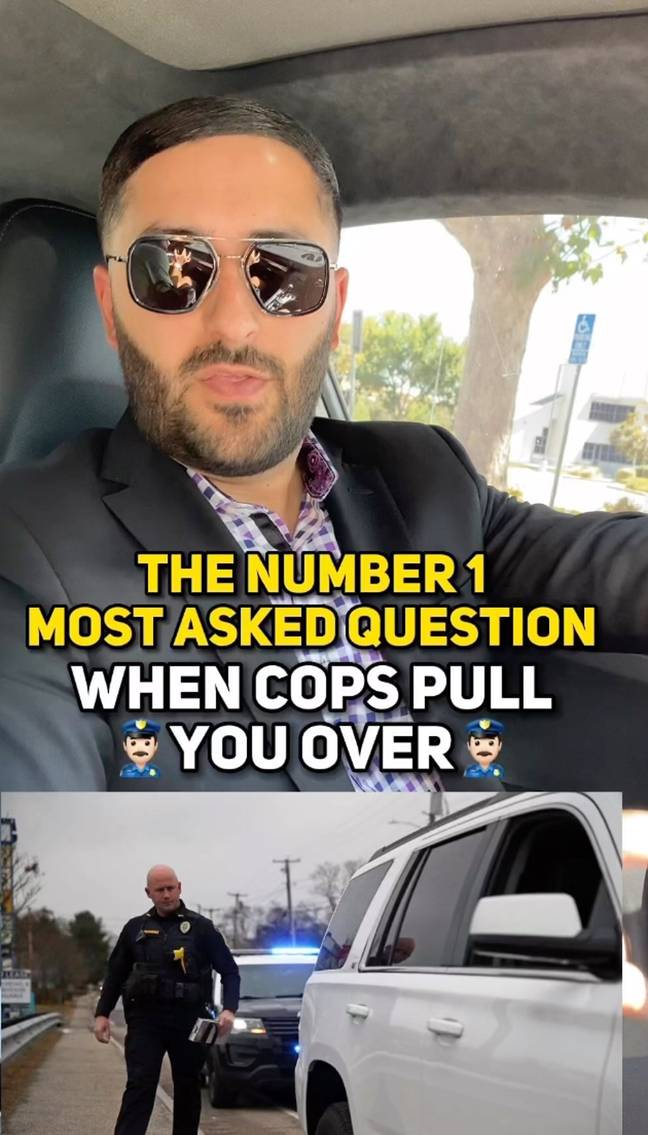Picture this: You’re cruising down the highway, and suddenly, those ominous red and blue lights fill your rearview mirror. Your heart races as the police officer approaches your vehicle, and you can feel the tension in the air. In this high-stress moment, there’s one question that almost every cop will inevitably ask: “Do you know why I pulled you over?” It’s a seemingly innocent query, but as any seasoned lawyer will tell you, it’s a loaded one.

Many lawyers advise against answering this question for a simple yet profound reason: your response can potentially be used against you. When you admit to a traffic violation or provide an explanation, you’re essentially volunteering evidence that could be used in court. This can weaken your defense if you decide to fight the ticket later or face more serious charges.
The Top Question You Shouldn’t Answer When Pulled Over by the Police
Hopefully, you’re not the sort of person who finds themselves on the wrong side of the law due to driving above the speed limit. However, if you do ever find yourself pulled over by a cop for overdoing it a bit on the accelerator, one US lawyer has shared the one thing you shouldn’t say.
Taking to YouTube, attorney Narimon Pishnamaz revealed the ‘number one most asked question when cops pull you over’ as well as how you should respond to it. He explained: “The cops will ask you, ‘where are you coming from?’ or ‘where are you headed?'”
Narimon, who refers to himself online as ‘Attorney Pish’, continued: “The cop’s testing to see if you were drinking. If you answer the question with, ‘I came from a party’, now he’s gonna assume you had something to drink. Instead, don’t answer that. Invoke your fifth amendment right to remain silent.”
Debate Around this Legal Advice
However, not all of Attorney Pish’s followers were convinced, with one replying: “Leading with that sounds like a good way to anger a cop and get a guaranteed ticket lol.” It’s important to remember that each individual situation and interaction with a police officer can differ, so the best course of action might vary.

Credit: Instagram/@attorneypish
Someone else quipped: “I tell them the truth, and waste both of our time. Gotta make sure I get my tax dollars worth,” while a third person said: “If you go full ‘due process’ so will they. You have the right to be a jerk, the cop has the right to write up every minor violation from a dirty license plate to speeding.”
Be Aware of Your Rights
Meet Mike Mandell, the self-proclaimed kingpin of legal expertise in the world of social media. This legal maverick doesn’t just use his online presence for self-promotion; he’s on a mission to empower his followers with valuable legal advice. In a riveting video that has taken the digital legal world by storm, Mike dishes out some street-smart wisdom on what to do when you find those flashing blue and red lights in your rearview mirror for speeding.

Credit: @lawbymike/TikTok
With a grin that says, “I’ve got your back,” Mike’s advice is simple but cunning: when the officer asks, “How fast do you think you were going?” respond with a sly, “How fast was I going?” It’s a clever maneuver to dodge the speeding bullet, so to speak. In the world of Mike Mandell, silence is your ally, and admissions are your enemies. As he succinctly puts it, “Never ever admit to speeding because anything you say will be used against you.”
However, Mike Mandell, despite his online charisma and legal wisdom, is quick to remind us of a universal truth: the law is as complex as it is unforgiving. His sage counsel is a starting point, not a one-size-fits-all solution. The laws vary from place to place, and each case has its nuances. He emphasizes the critical importance of staying informed about the laws in your jurisdiction and seeking the guidance of a seasoned legal professional when the need arises. In the labyrinth of the legal world, Mike Mandell might be the torchbearer, but it’s always prudent to have a skilled attorney by your side when the stakes are high and the flashing lights beckon.
Understanding Your Rights When Pulled Over
When you find yourself being pulled over by the police, it’s important to understand your rights and know how to handle the situation effectively. While the advice given by lawyers may vary, it’s crucial to exercise caution and respect during any interaction with law enforcement. Here are some additional tips to keep in mind:
1. Stay Calm and Compliant
Remaining calm and cooperative can help de-escalate the situation and ensure a smoother interaction with the police. Keep your hands visible, preferably on the steering wheel, and avoid making any sudden movements that could be misconstrued as a threat.
2. Know Your Rights
Familiarize yourself with your constitutional rights, such as the right to remain silent (Fifth Amendment) and the right to legal representation (Sixth Amendment). Utilizing these rights can help protect your interests during a police encounter.
3. Be Mindful of Your Words
Choose your words carefully when interacting with the police. Avoid volunteering information or making self-incriminating statements. It’s generally advisable to provide basic identification and vehicle documentation when requested but remain cautious about providing further details without consulting an attorney.
4. Safely Pull Over to the Side of the Road
Once you’re aware that a police officer wishes to pull you over, look for a safe place to do so promptly. Signal your intention to pull over and slowly navigate to the side of the road, ensuring the safety of both yourself and the officer.
5. Follow Proper Etiquette
Demonstrate respect towards the police officer throughout the interaction. Avoid arguing or becoming confrontational, as this may escalate the situation. Remember that any disputes or disagreements can be addressed with legal assistance at a later time.
Protect Your Rights and Stay Informed
Facing a traffic stop can induce anxiety and tension, but it’s crucial to remain composed and informed to safeguard your rights. The keys to a smooth interaction with law enforcement lie in awareness and wise decision-making. Although the specifics of legal advice can vary, maintaining a calm demeanor and adhering to the instructions of the officer are initial steps in the right direction. However, there are moments when invoking your constitutional rights becomes necessary. It’s essential to be knowledgeable about these rights, such as your right to remain silent and the right to an attorney.
Knowledge is power, and that power becomes even more critical during a traffic stop. The legal landscape can be complex and intricate, which is why it’s vital to consult with a qualified attorney who can provide guidance tailored to your specific circumstances. Your attorney can offer insights into the laws and regulations specific to your locality, ensuring that you have the most up-to-date information at your disposal. Armed with this knowledge, you’ll approach encounters with law enforcement with greater confidence, knowing that you are preserving your legal interests and asserting your rights.
In essence, protecting your rights and staying informed is not just a legal strategy; it’s a fundamental aspect of being an informed and responsible citizen. By arming yourself with knowledge and making prudent decisions during a traffic stop, you not only safeguard your interests but also contribute to a society where individual rights are respected and upheld. So remember, knowledge is your best ally when it comes to navigating the complexities of a traffic stop and ensuring that justice prevails.
Source: What are my rights when getting pulled over?

This Site Was Inspired By An Interest in Protecting the Environment:
We had the privilege and joy of learning from Dr. Charlie Stine who instilled a love for the natural world through incredible field trips with the Johns Hopkins Odyssey Certificate program in Environmental Studies. At the time, the program was endorsed by the Maryland Department of Natural Resources. Sadly, after Dr. Stine retired, the program was phased out. We hope that we honor his legacy by shining a bright light on environmental issues and sharing good news about the success of various conservation programs when possible.

